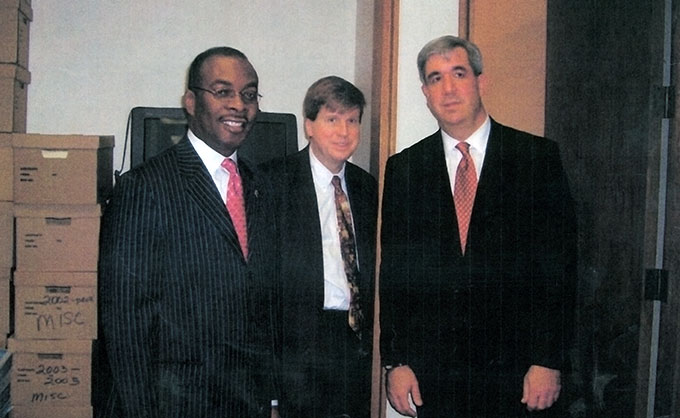Sedita Refuses to Address PBA's Complaint About Brown Campaign Commercial
by Geoff Kelly

On August 7, the Buffalo Police Benevolent Association asked Erie County District Attorney Frank A. Sedita III to investigate whether a campaign commercial for Mayor Byron Brown that included endorsements by uniformed police officers standing on city property constituted a breach of state election laws and the federal Hatch Act.
William J. Gambino, first vice president for the PBA and chairman of its political action committee, wrote, “The use of public resources and public servants for private partisan political purposes is unethical, wrong, and in our recently sought legal opinion, in violation of a number of laws.”
Gambino argued that the use of uniformed officers in Brown’s 60-second campaign ad violated the Hatch Act, which restricts the political activities of public employees whose agencies are funded in part or in whole by the federal government. (The Buffalo Police Department recieves federal grants.) Gambino also argued that the commercial violated state election law, which makes it a misdemeanor for a police officer to use “his official power or authority, in any manner, directly or indirectly, in aid of or against any political party, organization, association or society, or to control, affect, influence, reward or punish, the political adherence, affiliation, action, expression or opinion of any citizen…”
“We trust that as this county’s top law enforcement officer our concerns will be addressed with the full attention of your office,” Gambino wrote.
But that’s not quite how Sedita responded.
On August 14, Sedita sent a letter in reply to Gambino that fairly dripped with sarcasm and condescension. Sedita sidestepped the allegation of a Hatch Act violation by pointing out that his office could only prosecute state crimes. He argued that the supporting legal opinion the PBA attached to its letter regarding the alleged violation of state law seemed, to Sedita, to conclude that the use of police officers in a campaign commercial was in fact lawful.
He then basically told Gambino and the PBA to investigate the charges themselves:
I understand that in addition to being Chairman of the Buffalo PBA Political Action Committee (naturally, I have dismissed the cynical suggestion that your call for an investigation of Mayor Brown is politically inspired), you are also a detective. Your correspondence is unclear as to what, if any, meaningful investigation has been done by your department in support of your allegations.
After suggesting that Buffalo police officers should investigate the campaign of the man who signs their paychecks, Sedita claimed that the New York State Board of Elections alone is charged with investigating state election law violations. Take your problem there, he wrote.
Sedita did not say who made the “cynical suggestion” to him that the PBA’s allegations were politically motivated, but he was referring to the fact that the PBA has endorsed Brown’s Democratic primary opponent, former Buffalo FBI chief Bernie Tolbert. There is, of course, an equally cynical suggestion to make: that Sedita’s lack of interest in addressing the allegation has more to do with his political alliance with Brown than it does with a lack of jurisdiction or compelling evidence. The two are tied together politically. Sedita has donated to Brown’s campaigns. Sedita’s wife, Leslie Sedita, is a well-compensated employee of the Buffalo Sewer Authority; the mayor signs her paychecks, too. .
But let’s dismiss the cynical suggestion that Sedita is deeply conflicted. In fact, district attorneys do investigate state election law violations. The DA’s office successfully investigated election law violations in Paul Clark’s 2007 campaign for Erie County executive. (True, Sedita then stopped short of following the investigation to the activities of political apparatchik Steve Pigeon, a close ally of the Sedita family.) The DA’s office prosecuted former Common Councilman Brian C. Davis for misusing campaign money. More recently, Sedita was given a case of alleged voting fraud in Niagara County to investigate, referred to his office by Niagara County District Attorney Michael J. Violante in order to spare Violante the appearance of or actual conflicts of interest.
It seems reasonable that Sedita, rather than dismissing out of hand this allegation against a political ally, should follow suit and refer the PBA’s complaint to another district attorney.
That would seem the prudent response from a member of the governor’s Moreland Commission, charged with investigating fraud and corruption in state government and politics. Instead, Sedita responded with condescension and sarcasm. His whole letter is posted here on AV Daily.
blog comments powered by Disqus|
Issue Navigation> Issue Index > v12n34 (Week of Thursday, August 22) > The News, Briefly > Sedita Refuses to Address PBA's Complaint About Brown Campaign Commercial This Week's Issue • Artvoice Daily • Artvoice TV • Events Calendar • Classifieds |









 Current Issue
Current Issue